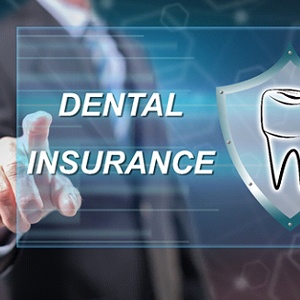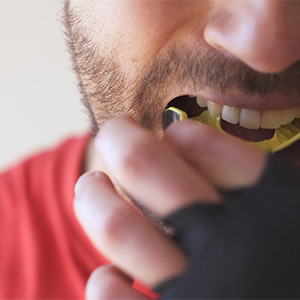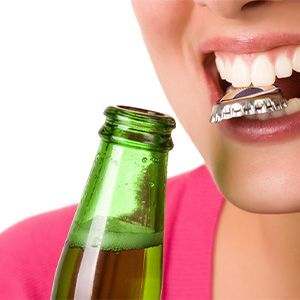
Emergency Dentist — North Dallas, TX
Fast Relief and Treatment for Emergencies
When you least expect it, a dental emergency can pop up and ruin your day. But, thanks to our team at Sunny Smile Dental, it doesn’t have to ruin your smile. You can rely on Dr. Sung-Hee Lee and our compassionate team to relieve your pain and resolve the problem as soon as possible. If you or a loved one experiences a dental emergency, don’t hesitate to call our North Dallas dental office right away! In fact, we recommend saving our number in your phone just in case you need emergency dentistry in North Dallas, TX.
Why Choose Sunny Smile Dental for Emergency Dental Care?
- Same-Day Emergency Appointments Available
- Nitrous Oxide Sedation In-House
- We Accept Dental Insurance
How We Treat Dental Emergencies

- Scheduling a same-day appointment with our team: After you get in touch with our office, we can get you scheduled for an appointment, take note of your symptoms, and provide first-aid tips over the phone if needed. We’re prepared to schedule a same day visit, so don’t wait if you call if you fear you’re having a dental emergency.
- Completing a detailed emergency exam: After you reach our office, we can perform an emergency examination and capture digital X-rays if necessary. This will help us confirm where your symptoms are coming from and the severity of your dental emergency.
- Reviewing your findings and making a plan: After going over our findings with you, we can recommend a more detailed treatment plan that resolves your emergency at the source and prevents it from getting worse. We’ll always explain your cost estimates ahead of time so you can make an informed decision on your care.
- Get the dental care you need ASAP : Our team will work as quickly as possible to complete your care, whether it’s a dental filling, crown, root canal therapy, extraction, or another service if necessary.
The Most Common Dental Emergencies
In most cases, your first move should be calling Sunny Smile Dental. Not only can we get you on our schedule quickly, but we can provide specific advice for dealing with your particular situation. After all, what you do before you come in can have an effect on your treatment. But don’t worry! Our team will be here to help you through the whole process. Below are just some general tips for some of the most common types of emergencies.
Understanding the Cost of Dental Emergencies

Although each dental emergency is unique, one thing remains the same in all cases—it’s never a good idea to postpone getting essential treatment. Not only can you experience pain longer than necessary, but the problem can only get worse with time, likely costing you even more to fix it later on. If you are concerned about the cost of treatment, talk to our knowledgeable team. We can work with you to make the cost fit within your budget. In the meantime, here are some things to keep in mind.
Every Dental Emergency is Different

Numerous different factors contribute to the cost of dental emergency treatment, but your initial visit should be relatively inexpensive. During your appointment, our team will take a look at your smile and determine what type of treatment is necessary to restore it to health. Until you have the issue looked at, it is pretty much impossible to accurately determine the exact cost of your treatment. Some common solutions to dental emergencies include the following:
- Root canal therapy
- Extractions
- Dental crowns
- TMJ treatment
- And more!
You can relax knowing that our dental team is prepared to thoroughly explain our findings, recommended treatment plan, and expected cost. No one wants to end up with a bill higher than initially expected.
Does Dental Insurance Cover Dental Emergencies?

In most cases, dental insurance plans will offer some amount of coverage for emergency situations. In some plans, one yearly emergency exam is fully covered. Common services associated with tooth pain, like root canal therapy and extractions, can receive partial coverage (anywhere from 50-80%). Keep in mind that all plans are different and yearly maximums usually come into effect. It is a good idea to confirm what is covered with your insurance company before committing to treatment. At Sunny Smile Dental, we are in-network with many major dental insurance providers, and we are more than happy to accept your insurance and file claims on your behalf. If you have any questions, talk to one of our friendly team members.
Other Options for Making Dental Emergencies Affordable

If you don’t have dental insurance, this doesn’t mean that you’re completely out of luck. We work with CareCredit, a third-party financing company that can split the cost of your treatment into manageable monthly instalments with little-to-zero interest attached. We also offer a $30 new patient exam and X-ray special. Seeking dental treatment shouldn’t mean stressing over finances!
Taking Care of Your Smile Can Save You Money

Not all dental emergencies are preventable, as unexpected, unavoidable incidents can occur. However, when you implement some extra steps into your life, you can reduce your chances of developing oral health issues that eventually need emergency treatment. By avoiding dental emergencies, you can save hundreds, or even thousands of dollars over time.
You should always keep an eye out for changes in your mouth. New oral pain or visible changes can indicate that you have an issue that needs to be addressed. By caring for dental problems as soon as possible, you can keep them from progressing and becoming more serious. The longer that you put off dental treatment, the more it is likely to cost as well. For instance, if you come to the practice for root canal therapy now, you may be able to avoid the cost and hassle of needing an extraction and tooth replacement in the future. Ultimately, you can save time, discomfort, and money!
Dental emergencies can happen out of the blue so we’re always happy to help. This is why we are prepared to see you as soon as possible! Contact us so we can work to restore your smile to health.
How to Prevent Dental Emergencies

Dental emergencies can typically feel overwhelming, especially when they catch you by surprise. While some of them are unpredictable, many can be avoided. In fact, the majority of people who seek emergency dental care often struggle with tooth decay that could have been prevented ahead of time. For this reason, it’s important to know the crucial steps you can take to significantly reduce your risk to your pearly whites in your everyday life. Read along to learn five essential ways to prevent dental emergencies in Dallas!
Visit Your Dentist Regularly

Many dental situations such as cracks, cavities, and infections can be emergencies in the making without you even noticing them. To avoid this possibility, it’s best that you regularly schedule checkups and cleanings with us every six months or sooner. Dr. Lee will be able to monitor your oral health and address any developing issues she may detect from becoming bigger problems in the future. Our team will also polish your pearly whites and prescribe you personalized preventive care to help you prevent dental emergencies from starting.
Maintain Good Oral Hygiene At Home

One of the most effective ways to protect your smile is to practice good oral hygiene. Without frequent cleaning, your teeth and gums can be at risk of plaque, tartar, and bacteria buildup. When these are left unchecked, they can cause your enamel to weaken, infect your gum tissue, and make you more vulnerable to more serious health issues, such as lung and heart disease. To prevent this, be sure to brush for two minutes twice each day, floss at least once, and rinse with mouthwash regularly.
Stick to a Nutritious Diet

Most people are aware that eating candies or sugary foods too often can cause cavities or give you a toothache. However, other meals can be just as detrimental to your dental health. Overconsumption of hard foods, sticky treats, and acidic drinks can drastically heighten your risk of various dental emergencies, such as cracked teeth or even dental abscesses. Instead, try to eat meals that are high in calcium, fiber, and vitamin C to maintain a stronger and healthier smile naturally and deliciously!
Wear a Mouthguard

While your tooth enamel is the hardest material in your body, it can still be vulnerable to injury. Whether it’s due to sudden physical trauma or prolonged exposure to pressure, your pearly whites can sustain significant damage that may require emergency care. If you like playing sports or any physical activity that can risk your teeth being harmed, feel free to speak with us about custom-crafted sports mouthguards. Also, if you tend to grind your pearly whites while asleep or awake, you may want to ask about personalized nightguards for bruxism. Our team will be more than happy to recommend the best products to help you maintain your smile.
Use Tools, Not Your Teeth, to Open Packages

If you tend to use your teeth to conveniently open packages, hold items, or remove a bottle cap, then you may be at serious risk of a dental emergency. These practices can easily become costly, as you might end up needing us to address a chipped or cracked tooth. Try to keep the proper tools nearby so you can keep your dental health intact. Make sure never to use your pearly whites for anything other than chewing food, talking, and showing off a brilliant smile!
Dental Emergency FAQ’s

Dental emergencies are unsettling and can happen when you least expect them to. But don’t worry – if you’re ever in pain and find yourself in one of these unfortunate situations, Dr. Lee can give you the prompt relief you deserve. At Sunny Smile Dental, we will do everything possible to put your mind at ease. That’s why we’ve decided to answer some frequently asked questions we receive from patients about dental emergencies. If you don’t see your specific question below, feel free to give us a call!
Will My Toothache Go Away on Its Own?
In most cases, a toothache will not go away on its own. Since it’s usually the result of severe decay, you’ll need professional dental treatment to alleviate it. As soon as you notice tooth pain, you should schedule an appointment with Dr. Lee right away to ensure nothing is wrong. She’ll conduct an oral examination to rule out any underlying problems that could be contributing to your discomfort. By seeking treatment right away, you can address any issues before they turn into more serious complications.
How Should I Sleep with Tooth Pain?
If you have a nagging toothache at night, it’s likely preventing you from getting some much-needed sleep. Fortunately, there are a few ways you can dull the pain just enough to get some rest. Make sure you keep your head elevated to prevent blood from rushing to your head and intensifying your pain. You can also take over-the-counter pain medication as needed for improved comfort or use a cold compress.
Can the Emergency Room Remove a Tooth?
It may surprise you to learn that only licensed dentists can perform tooth extractions. It’s illegal for anyone to perform the procedure without proper training and education, even in a hospital setting. If you go to an emergency room for a dental emergency, they’ll only be able to provide antibiotics and pain medication. Although that can alleviate your discomfort, it won’t address the underlying problem causing your toothache. That’s why it’s always best to see an emergency dentist for these types of situations.
What Does Throbbing Tooth Pain Mean?
A throbbing toothache often indicates an infection or inflammation within the tooth. When cavities inside the tooth allow air and bacteria to reach the inner portion, it can result in irritation and potential infection of pulp nerves. However, there are also some cases where throbbing teeth could be because of chronic teeth grinding and clenching.
I Need a Checkup & Cleaning I Have a Cavity or Broken Tooth I am Missing One or More Teeth I Want to Enhance My Smile I am Concerned About Bleeding Gums I am Afraid of the Dentist I Need My Wisdom Teeth Extracted Orthodontics Dental Implants View Our Services